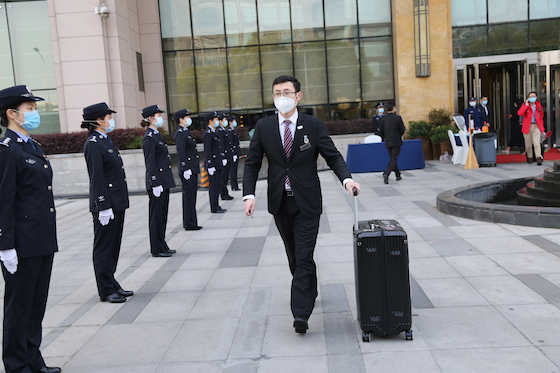General Manager Alan He likens Wyndham Hotel Jingzhou to a fortress that withstood a siege. Only two hours by road from Wuhan, epicenter of a global COVID-19 pandemic, the only high-end hotel in this small city on the Yangtze River shut down along with much of China in January, but reopened in April.
“The virus was the enemy,” he says. “This was like a fort.”
Because of the timing, as restrictions were imposed around the Chinese New Year holiday, many workers wound up with family in distant villages. He hunkered down with 40 of his 215 staff, doing repairs and retraining as occupancy plunged to zero.
“It was a disaster,” he concedes. Yet, following a lift of severe 11-week restrictions on April 10, guests were trickling back. “And bookings for May (were) picking up,” he says. “Everything is opening up again.”

Contributed by Ron Gluckman
Around China, the turnaround seems miraculous, especially since a few months ago, nobody would have projected that China would be back in business, while most of the world is still battling the pandemic. Hence, there is an eerie feeling of looking into the future of hospitality, as China moves into a post-COVID phase.
“We think local tourism will be the immediate focus,” He says of the sentiment shared by other China hoteliers. Early reports indicate that domestic travel will initially dominate China business, and fuel the hospitality recovery, with a return of international travel, meetings and conferences to follow.
STR reported an almost 90% decline in occupancy across China after the country imposed severe containment measures to control the spread of the coronavirus early this year. Not all properties and areas of China were uniformly impacted, but by the end of March, STR reported occupancy had rebounded by about 30%. Early data shows the recovery is strongest amongst weekenders, and middle and economy classes of travel, according to Christine Liu, STR’s regional manager for North Asia.
Hygiene prioritized
Cleanliness and safety concerns have moved to the forefront. “Sanitizer stations in public areas will be the norm going forward,” says Holger Jakobs, vice president of sales and marketing for Wharf Hotels, Hong Kong.
Wyndham posts its cleaning schedule on weibo (often compared to Twitter). “Guests want to be reassured,” He says. “We share videos and pictures, it’s a major part of building confidence.”
Many hotels have done a total rethink on sanitation and cleaning procedures. “Guest safety and cleanliness have always been priorities. The current crisis has simply increased the urge of additional protection and awareness,” Jakobs says.
High traffic and public areas receive more frequent attention, with in-room items rotated after every checkout. Wharf marks elevators so linens heading to the laundry never have even the chance of contaminating fresh linen headed to rooms being refreshed. Cleaning schedules are posted for full transparency.
Will social isolation lead to continued distancing? Already room service has returned to popularity, and China hoteliers talk of cutting back on buffets in favor of more a la cart, and replacing happy hour get-togethers by distributing individual-packaged snacks. Capella Shanghai is entirely villas, boasting their own air circulation system, and another throwback: actual windows.
Even so, villas are rotated so no guest stays in a room that has been used within the previous 24 hours, says Stephanie Zhang, director of marketing communications.
Stefan Leser, CEO of Langham Hotels International, Hong Kong, compares the transition to the time after the Twin Towers attack.
“Before, it was all about seamless travel, how quickly you could be moved through an airport,” he says. “After 9/11, it was ‘take your shoes off,’ it was all about safety.” So, masks and cleaning gel are likely to be standard in-room amenities. And hotel design might change, he speculates, with reconsideration of things like air conditioning and circulation.
Langham has repurposed its China operation, Leser says, keeping all hotel staff on payroll, using the downtime for retraining and renovation. “Now that we are reopening, these properties are in the best shape ever,” he says.
